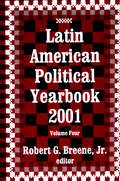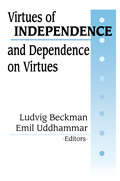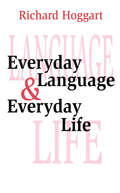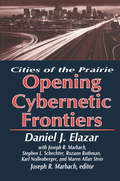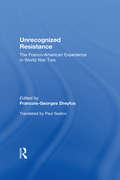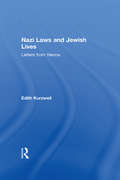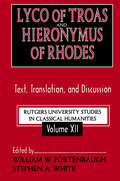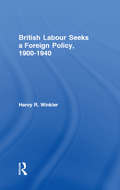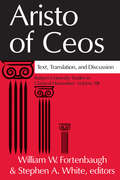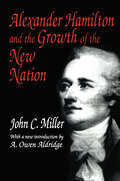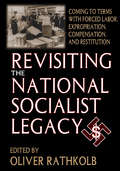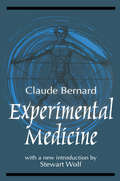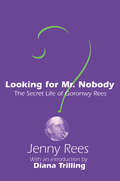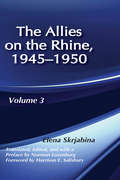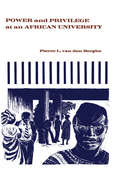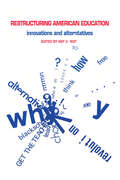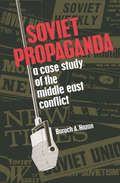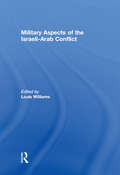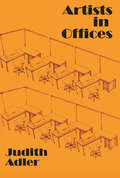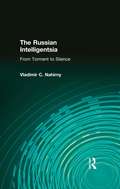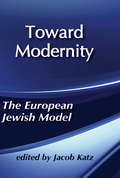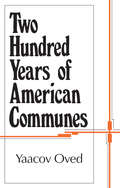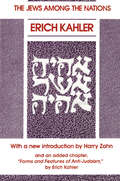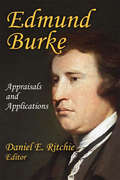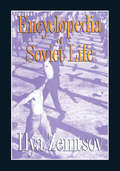- Table View
- List View
Latin American Political Yearbook: 2001
by Jr. DentonIn the fourth volume of this annual series, Robert G. Breene provides a comprehensive overview, analysis, and summary of the major political and economic trends and events in Central America, MERCOSUR, Andean and Caribbean nations, and Mexico. Analyzing these developments within the individual nations, their respective regions, and the world at large, the yearbook offers a timely look at the relevant background and information necessary to understand the changing nature of politics in Latin America today.The volume's opening two chapters continue the coverage of the earlier volumes, presenting details of various Latin American elections with relevant background information. The remaining five chapters cover various aspects of the development of regional history during the year 2001. Chapter 3 on U.S. diplomacy examines the immediate impact of President Clinton's various Latin American trips and initiatives. The Hemispheric Left and support for the Hemispheric Left are treated in general terms in chapter 4, while the next three chapters examine specific nations, Colombia (chapter 5), Venezuela (chapter 6), and Cuba (chapter 7) where these forces were of particular importance during the year.The material presented on Cuba is of particular interest considering the September 11, 2001 outrage; although, as the editor notes, it remains to be seen if the measures adopted at Guantanamo did keep Castro from dabbling in the aftermath. The final chapter continues the series' discussion of Latin American international organizations such as the Grupo de Rio and the Organization of American States. The continuity of the information presented in these volumes is one of their valuable assets as is the examination of the Disinformation Operation (DO) of the Hemispheric Left. Disinformation examples are many, ranging from the Harbury DO in Guatemala through Ruz Castro's Foro Soo Paolo and the totally misrepresented Zapatista National Liberation Army to the Great Gringo DO continues to operate with impunity.This is a reference volume with a point of view. It is brimming with facts and provides information not readily available through the American media. Compact, yet comprehensive, it is essential reading for political scientists, Latin American area specialists, and historians.
Virtues of Independence and Dependence on Virtues
by Ludvig Beckman Emil UddhammarDebate about the concept of virtue is a persistent theme in academic discourse. One strand of thinking attempts to examine and reconstruct ethical theories with the aim of formulating a new morality or ethics. A second strand of thought, more strongly represented in this work, attempts to explore the social and political world deploying the concept of virtue. Thus, this volume crosses the established borders of academic disciplines in order to provide a richer and more comprehensive understanding of the place of virtues in contemporary western societies.The editors hold that the dominating virtue of our culture and society is the virtue of independence. Yet independence, or individual autonomy, is contingent upon a diverse, and so far ill-understood, set of cultural, biological, economic, ethical, and political practices. The idea of individuality is in other words supervening on a web of formal and informal relations. This volume therefore attempts to improve our understanding of the prevailing ethos of independence as well as of the mechanisms and practices sustaining it.Virtues are examined in specific contexts. Authors explore what we can learn about our dependence on virtues from the archaic Greek culture. They examine the relevance of virtue-ethics to the understanding of day-to-day practices. And they look at the place of virtues in understanding the norms of independence and liberty. Other contributions attend to the virtues of independence and its challenges, examining possible philosophical challenges, questioning whether independence is always a virtue, and how the virtues of justice fare given a commitment to the virtues of independence.The final portion of the book explore the empirical consequences of the virtues of independence. Among the questions addressed are how personal independence affects political and economic institutions, and the connections between norms of independence and the growth of modernity. This volume is an important contribution to contemporary understanding of what constitutes virtuous and ethical behavior.
Everyday Language and Everyday Life
by Richard HoggartFor years Richard Hoggart has observed the oddity of a common speech habit: the fondness for employing ready-made sayings and phrasings whenever we open our mouths, a disinclination to form our own sentences "from scratch," unless that becomes inescapable. But in this book he is interested in more specific questions. How far do the British, and particularly the English, share the same sayings across the social classes? If each group uses some different ones, are those differences determined by location, age, occupation or place in the social scale? Over the years, did such sayings indicate some of the main lines of their culture, its basic conditions, its stresses and strains, its indications of meaning, and significance? These and other concerns animate this fascinating exploration of how the English, and particularly working-class English, use the English language.Hoggart sets the stage by explaining how he has approached his subject matter, his manner of inquiry, and the general characteristics of sayings and speech. Looking back into time, he explores the idioms and epigrams in the poverty setting of the early working-class English. Hoggart examines the very innards of working-class life and the idioms, with the language that arose in relation to home, with its main characters of wives and mothers, husbands and fathers, and children; the wars; marriage; food, drink, health, and weather; neighbors, gossip, quarrels, old age, and death. He discusses related idioms and epigrams and their evolution from prewar to present.Hoggart identifies the sayings and special nuances of the English working-class people that have made them identifiable as such, from the rude and obscene to the intellectual and imaginative. Hoggart also examines the areas of tolerance, local morality, and public morality, elaborating on current usage of words that have evolved from the fourteen through the eighteenth centuries. He touches on religion, superstition, and time, the beliefs that animate language. And finally, he focuses on aphorisms and social change and the emerging idioms of relativism, concluding that many early adages still in use seem to refuse to die.With inimitable verve and humor, Hoggart offers adages, apothegms, epigrams and the like in this colorful examination drawn from the national pool and the common culture. This volume will interest scholars and general readers interested in culture studies, communications, and education.
The Opening of the Cybernetic Frontier: Cities of the Prairie
by Daniel ElazarThe Opening of the Cybernetic Frontier is the third in-J. stallment in the Cities of the Prairie project. It completes an ongoing multi-generational, comparative study of ten medium-sized communities located in five Prairie and Plains states - Illinois, Iowa, Minnesota, Wisconsin, and Colorado. This long-term study was initiated by Daniel J. Elazar in 1959 to develop a comprehensive theory explaining and forecasting the development of the civil community based upon the changing relationship between internal developments and external factors.In this new volume, Elazar and his colleagues trace developments in these communities during the 1980s and 1990s. The study examines how local communities function politically, socially, and economically, and then analyzes the impact that regional, national, and international trends and patterns have on local political systems in general and the cities of the prairie in particular. It revisits these communities at the dawning of a new frontier, the city-cybernetic frontier, which is characterized by a knowledge-intensive economic base made possible by computer and communication technologies. Changing technology has accelerated the settlement patterns that emerged after World War II. Ongoing population sprawl means that individuals are leaving the suburbs to live in the exurbs and beyond, creating a citybelt phenomenon that relies upon new technologies.
Unrecognized Resistance: The Franco-American Experience in World War Two
by Paul SeatonAt a time of differing perceptions of and frayed relations between the historic alliance between France and the United States, this volume merits the attention of serious people in government service and a wider public. It describes deeds of enormous courage, performed at great risk, in a time of crisis. The behavior of American soldiers and intelligence officers, and the extraordinary support from ordinary French men and women in Nazi-occupied France during World War II, is a story too little remembered today, and even less frequently told. This volume is an edited summary of what transpired at a unique colloquium held in the Salle Mdicis of the Palais du Luxembourg in Paris in December 2000, and hosted by the president of the French Senate.
Nazi Laws and Jewish Lives: Letters from Vienna
by Edith KurzweilAlthough the period leading up to the Nazi genocide of Europe's Jews has been well recorded, few sources convey the incremental effect of specific decrees aimed to dehumanize the Jews who were caught in Hitler's net, and how their everyday lives were transformed. These letters, written by Malvina Fischer to her daughter Mimi Weisz, have been translated and edited by her granddaughter Edith Kurzweil. They convey with vivid immediacy the fears and premonitions, the ghettoization and escape attempts that were the common experience of Viennese and German Jews in the years preceding the implementation of the "Final Solution."In the first section of the volume, Kurzweil establishes the personal and political contexts of the letters (written between April 6, 1940 and December 1941, when Malvina Fischer and her family were deported) and links them to the then emerging "Jewish laws." The second section contains the letters themselves and documents the throttling grip in which the authorities held every Viennese Jew who had not managed to escape. The third section consists of translations of official summaries of the relevant laws, ordinances, and edicts--many of them marked "secret"--which inexorably determined that Kurzweil's family become part of the "final solution." From these letters and documents we become aware, also, of the profusion of legal entities dealing with Jews, the rivalries among them, and the free-floating dimensions of victims' fear and dread.Because the letters are full of allusions rather than straightforward information, and characterized by self-censorship, Edith Kurzweil has annotated them and inserted the relevant numbers of the specific laws as these were being applied.
Lyco of Troas and Hieronymus of Rhodes: Text, Translation, and Discussion (Rutgers University Studies in Classical Humanities)
by Stephen WhiteVolume 12 in the RUSCH series continues work already begun on the School of Aristotle. It focuses on two Peripatetic philosophers who lived in the third century BCE, when Stoicism and Epicureanism flourished. Lyco of Troas was the third head of the Peripatos after Aristotle. Hieronymus of Rhodes was a member of the school and an antagonist of Lyco.Excellence in teaching was Lyco's distinguishing attribute, but he also attracted benefactors and had the reputation of being a bon vivant. Hieronymus is best known for his work on ethics, but he also wrote on literature, history, and rhetoric. Our understanding of the work being done in the Peripatos during the third century BCE will be greatly enhanced by Peter Stork's new edition of Lyco and Stephen White's edition of Hieronymus.The two editions in this volume are accompanied by full translations as well as notes on the Greek and Latin texts (an apparatus criticus) and substantive notes that accompany the translation. The editions will replace those of Fritz Wehrli, which were made over half a century ago and published without an accompanying translation. In addition to the two editions, this volume includes ten essays that address significant themes presented by the texts. Three of the essays deal with biographical material: "Diogenes Life of Lyco" (J orgen Mejer), "Hieronymus in Athens and Rhodes" (Elisabetta Matelli), and "Peripatetic Philosophers as Wandering Scholars" (Peter Scholz). Four develop philosophical topics: "Hieronymus of Rhodes on Vision" (Todd Ganson), "The Historical Setting of Hieronymus fr. 10 White" (Peter Lautner), "Peripatetic Reactions to Hellenistic Epistemology" (Hans Gottschalk), and "Lyco and Hieronymus on the Good Life" (Stephen White). Three concern rhetoric and literature: "Lyco Phrastikos" (William Fortenbaugh), "Hieronymus on Isocrates' Style" (David Mirhady), and "Hieronymus in Ancient Commentaries on Hesiod's Shield" (Andrea Martano).
British Labour Seeks a Foreign Policy, 1900-1940
by Henry R. WinklerSince World War II, the British Labour Party has played a central role in dealing with complex international issues. Achieving real power in parliament for the first time, Labour governments have acted responsibly, and are usually in accord with the views of a substantial majority of the British people. Such was not always the case. In British Labour Seeks a Foreign Policy, 1900-1940, Henry R. Winkler synthesizes twenty years' study of the subject to offer the first full-scale treatment of the Labour Party's evolution in foreign affairs.The Labour Party came into existence at the beginning of the twentieth century to deal with the domestic problems of the working class, and it showed relatively little interest in foreign policy issues. In the aftermath of World War I, however, small groups of moderates made the case against the bitter rejection of the Versailles Treaty by many in the Labour Party and the trade union movement. Most of these argued that the League of Nations could be used to remedy some of the deficiencies of the settlement and that such a League must have the sanction of force if it was to be effective.During the 1930s, the failures of the League--in the Far East, Abyssinia, Spain, and Central Europe--compelled some of its advocates to conclude that, League or no League, the threat from Nazi Germany mandated support for a program of preparedness and rearmament even under the aegis of a hated National Government. The result, by 1937, was the final formal abandonment of many of the radical illusions of the twenties and thirties, as Labour reluctantly but formally assumed a posture that enabled it to share in the governance of wartime Britain and to take a key role in dealing with the international issues that emerged in the aftermath of the Second World War.This volume contains valuable lessons on the responsibilities of political parties as well as the pros and cons of specific policies. It is essential reading for understanding Britain's later stands as its leaders tried to adjust to Britain's diminished power in the post-World War II world.
Aristo of Ceos: Text, Translation, and Discussion (Rutgers University Studies in Classical Humanities)
by William W. Fortenbaugh Stephen A. WhiteVolume 13 in the RUSCH series continues work already begun on the School of Aristotle. Volume 9 featured Demetrius of Phalerum, Volume 10, Dicaearchus of Messana, Volume 11, Eudemus of Rhodes, and Volume 12, both Lyco of Troas and Hieronymus of Rhodes. Now Volume 13 turns our attention to Aristo of Iulis on Ceos, who was active in the last quarter of the third century BCE. Almost certainly he was Lyco's successor as head of the Peripatetic School. In antiquity, Aristo was confused with the like-named Stoic philosopher from Chios, so that several works were claimed for both philosophers. Among these disputed works, those with Peripatetic antecedents, like Exhortations and Erotic Dissertations, are plausibly assigned to Aristo of Ceos. Other works attributed to the Peripatetic are Lyco (presumably a biography of Aristo's predecessor), On Old Age, and Relieving Arrogance.Whether part of the last-named work or a separate treatise, Aristo's descriptions of persons exhibiting inconsiderateness, self-will, and other unattractive traits relate closely to the Characters of Theophrastus. In addition, Aristo wrote biographies of Heraclitus, Socrates, and Epicurus. We may be sure that he did the same for the leaders of the Peripatos, whose wills he seems to have preserved within the biographies.The volume gives pride of place to Peter Stork's new edition of the fragments of Aristo of Ceos. The edition includes a translation on facing pages. There are also notes on the Greek and Latin texts (an apparatus criticus) and substantive notes that accompany the translation. This edition will replace that of Fritz Wehrli, which was made over half a century ago and published without translation.
Alexander Hamilton and the Growth of the New Nation
by John C. MillerProbably no American statesman displayed more constructive imagination than did Alexander Hamilton. Prodigal of ideas, bursting with plans for diversifying the economy, and obsessed by a determination to make the United States a powerful nation under a centralized government, he left an imprint upon this country that time has not effaced. Alexander Hamilton and the Growth of the New Nation is the premier biography of Alexander Hamilton written by one of the foremost scholars of early American history. Hamilton's career was at times contradictory: born, in John Adams's words, the "bastard brat of a Scotch peddler," he rose to high social, political, and military position in the newly born country. He dreaded divisiveness, yet his strategies and actions aggravated political sectionalism. Miller weaves together the complex facets of Hamilton's life to make a vivid, absorbing biography.
Revisiting the National Socialist Legacy: Coming to Terms with Forced Labor, Expropriation, Compensation, and Restitution (Bruno Kreisky International Studies #Vol. 3)
by Oliver RathkolbSince the mid-1990s, political, legal, and historical debates about Nazi theft and confiscation of property, the use of slave labor during World War II, and restitution and compensation have reemerged. Revisiting the National Socialist Legacy presents completely new historical research on these issues conducted worldwide.This volume responds to concern about Holocaust era assets in Europe, the United States, and Latin America. It focuses on both reexamination of the history of National Socialist property theft and employment of forced labor in the wartime economy, and the compensation and restitution solutions advanced in various European and Latin American countries since 1945.
Experimental Medicine (Dover Books On Biology Ser.)
by Claude Bernard Stewart WolfThe French physiologist Claude Bernard was responisble for investigating the chemical phenomena of digestion. This text reproduces his research into experimental medicine. A new introduction looks at his impact on the world of medicine.
Looking for Mr. Nobody: The Secret Life of Goronwy Rees (Phoenix Giants Ser.)
by Jenny ReesGoronwy Rees (1909-1979) was one of the most gifted and promising figures in the constellation of British poets, journalists, and intellectuals of the 1930s that included Louis MacNeice, W. H., Auden, C. Day Lewis, Isaiah Berlin, and Anthony Blunt. Like many liberals of his generation, he was shocked by the effects of the Depression and correspondingly sympathetic to the Communist regime in Russia. Guy Burgess, of the Cambridge spies--Burgess, Maclean, Philby, and Blunt, admitted his espionage to Rees. His association with Burgess was to blight the rest of Rees's life. When Burgess defected in 1951, and Rees denounced him to MI5, Rees was viewed more as a spy out to save his own skin than as an honorable citizen. His anonymous, sensationalist articles in The People, denouncing Burgess's political activities and all but naming names, condemned him with the British intellectual community--not for his politics but for his betrayal of a friend. Colleagues and acquaintances accused him of trying to initiate a McCarthyite witch-hunt. He lost his job. His academic career was ruined. In Looking for Mr. Nobody, Jenny Rees deals with many of the old charges made against her father in her search for the answer to her own question, "Was he, too, a spy?" Had he joined up with Burgess and Blunt and passed secrets to the Soviet Union? Her quest for the truth reveals a fascinating portrait of a brilliant but flawed man of letters, handsome and seductively charming, caught up in the radical, political commitments of the 1930s, Communist Party membership, and his tortured relationship with the notorious Cambridge spies.
Allies on the Rhine, 1945-1950
by Elena SkrjabinaIn The Allies on the Rhine Skrjabina describes the coming of the Allies to the Rhineland, the occupation, and the first clear signs of the recovery of war-shattered Germany. She describes what occurred and how it was interpreted at the time by a keen observer who had lived under Soviet, Nazi, American, and French rule. She describes the first chaotic days of the occupation when instead of the calm and peace expected as a remit of the American advance, there was fearful chaos. She shows clearly that as the main allied forces moved on there was no real law and order and that she and the frightened populace were often terrorized by marauding youthful former work camp inmates over whom there was no effective control.
Power and Privilege at an African University
by Pierre L. van den BergheTo the best of the author's knowledge, this study, conducted from July, 1968 to June, 1969, is the first comprehensive sociological survey of an African university. This study did not begin with a set of specific hypotheses to be tested, nor does the research include everything of conceivable relevance to the University of Ilosho (U .I.). Instead, the focus is on the political structure of U.I., on social stratification and mobility, and on problems of ethnicity. These closely interrelated problems are of great importance to the development of Nigeria, where U .I. is located.
Restructuring American Education: Innovations and Alternatives
by Ray C. RistStructured schools, free schools, graded schools, ungraded schools, no schools at all—the conflicts over public education in America rage on, for contemporary schools have not lived up to our expectations. The essence of the criticism reflected in the essays in this volume is that America's dual educational goals—free inquiry and social mobility-are not being met. Instead of producing enlightened citizens capable of high social and economic mobility, our schools have become warehouses of children stored as commodities, docile and immobile.
Soviet Propaganda
by Bauch A. HuronFirst Published in 2017. Routledge is an imprint of Taylor & Francis, an Informa company.
Military Aspects of the Israeli-Arab Conflict
by Louis WilliamsThe Arab-Israeli conflict is fraught with political complexity. It entails long-standing, entrenched views on the part of all the participants, direct and indirect, and is heavily charged with emotion. It is a subject of great political and military actuality. The Middle East is fast becoming a testing ground for modern weapons systems and for modern, conventional war doctrines, a recent example being the Yom Kippur War.Most publications - articles, papers, books - on the war were produced while sentiments were still high and the armies still formulating their conclusions. Confusion, controversy, and emotions eclipsed clarity.
Artists in Offices: An Ethnography of an Academic Art Scene
by Judith E. AdlerUniversities have become important sources of patronage and professional artistic preparation. With the growing academization of art instruction, young artists are increasingly socialized in bureaucratic settings, and mature artists find themselves working as organizational employees in an academic setting. As these artists lose the social marginality and independence associated with an earlier, more individual aesthetic production, much cultural mythology about work in the arts becomes obsolete.This classic ethnography, based on fieldwork and interviews carried out at the California Institute of the Arts in the 1980s, analyzes the day-to-day life of an organization devoted to work in the arts. It charts the rise and demise of a particular academic art "scene," an occupational utopian community that recruited its members by promising them an ideal work setting.Now available in paperback, it offers insight into the worlds of art and education, and how they interact in particular settings. The nature of career experience in the arts, in particular its temporal structure, makes these occupations particularly receptive to utopian thought. The occupational utopia that served as a recruitment myth for the particular organization under scrutiny is examined for what it reveals about the otherwise unexpressed impulses of the work world.
The Russian Intelligentsia: From Torment To Silence
by Vladimir C. NahirnyVladimir C. Nahirny's brilliant study of major issues in Russian social and intellectual history synthesizes historical and sociological perspectives in an analysis of the nineteenth century Russian intelligentsia. He clarifies the concept of the intelligentsia itself, analyzes findings bearing on the social origins of different generations of intelligentsia, and enlarges understanding of conditions that facilitated the emergence of ideological groups among them. The Russian Intelligentsia develops a conceptually focused view of this distinct social group, arguing that the Russian intelligentsia can best be understood on the basis of orientation to ideas rather than on social or occupational position. Rather than simply providing an intellectual history or biographical sketches of major figures, Nahirny illuminates these concepts through data, creating an immersive context unlike other discussions of these groups. This book was, and will be, of interest to those interested in the problematic and contradictory social-political roles of intellectuals during this time.
Toward Modernity: European Jewish Model
by Jacob KatzFirst Published in 2017. Routledge is an imprint of Taylor & Francis, an Informa company.
Two Hundred Years of American Communes
by Yaacov OvedThe United States is the only modern nation in which communes have continuously existed for the past two hundred years. This definitive history of communes in America examines the major factors that have supported the existence and growth of communes throughout American history. The most impressive survey of the communal experience since the works of Noyes and Nordhoff, it is informed by a deep respect for the human subjects and organizational forms of American communes. The findings in the analytical chapters are of considerably theoretical import beyond the historical narrative.Oved details the founding, growth, development, and sometimes failure of alternative societies from 1735 to 1939: Icaria, Ephrata, Oneida, Shaker, religious, secular, and socialist communes. Extensive reference material cited will assure this work a special place in the archives of the literature on communes.
Jews Among the Nations
by Erich KahlerThis is an augmented edition of a superb volume by one of the foremost analysts of European institutions and ideas. Here the late Erich Kahler turns his attention to the special character of the Jewish people, formed uniquely through the interaction of internal and external circumstances in which past and present merge.The chapters in this book deal with persistent problems of Jewish identity. Kahler claims these can be fully understood only by awareness of the close interconnection between the singular ethnic nature and the unique social structure of the Jewish people. He discusses the Jews in Europe, specifically the historical implications of a strict tribal ritual that yet permitted the widest spiritual scope.The second half of the book concerns anti-Semitism, in relation to Jews and Germans. How did the German people, seemingly so congenial to the Jews, develop a murderous revulsion against them, ending a long and fruitful symbiosis? Kahler sees this as a parallel to the parricidal rejection of the Jews by the Christian church. His argument is deepened in an added chapter, new to this volume, on the major forms and features of anti-Judaism, 'in which the earlier theme of the universal and the specific are seen as central not only to the inner history of Judaism but also to the specific interaction of Jews and Gentiles throughout social history.
Edmund Burke: Appraisals and Applications (Library Of Conservative Thought Ser.)
by Daniel E. RitchieThe eighteenth century remains contemporary more than 200 years later because the fundamental questions raised then about politics in both the American and French Revolutions still speak to us. The writings of Edmund Burke on these and other political events of his time are today acknowledged as the basis of modern conservative thought. This volume brings together an outstanding collection of interpretative essays on Burke, and serves as a basic introduction to this seminal thinker.A member of the British Parliament from 1766 to 1794, Edmund Burke had sympathized with the American War of Independence and argued for reform of British policy toward Ireland and India, but he surprised many of his friends by his early, vehement opposition to the French Revolution. This volume brings together assessments of these and other statements by Burke by contemporaries such as Samuel Taylor Coleridge and William Hazlitt, along with essays by Irving Babbitt and Russell Kirk, who established his significance for twentieth-century conservatism.This is a collection of the best, previously published interpretive essays on Burke. It will be of interest to all those interested in the philosophical roots of conservatism, in the history of political thought, in revolution, and in modern political ideologies.
Encyclopaedia of Soviet Life
by Ilya ZemtsovA by-product of the amazing changes now taking place within the Soviet Union is a change in rhetoric no less than reality. Under Gorbachev, the Russian language has been changing parallel with novoe politichaskoe myshenie - new political thinking - with the effect that such new expressions as have flooded the Russian language clash with the less yielding realities of Soviet economy and society.The purpose of this volume is to clarify this dynamic in Soviet life, in which stagnation and decay confront hopes and expectations for liberalization. Zemtsov argues that the Soviet political language is self-contradictory, fractured into polarities of good and evil and thus depriving the Russian language of its basic subtlety, coherence, and inner logic.This work brings to life the Orwellian world of double-speak in a post-totalitarian environment. The Soviet language has two basic components: fictions which Communist ideology proclaims as reality, and realities that are portrayed in the guise of fictions. In this sense, Zemtsov undertakes to do for the Soviet language what the great H. L. Mencken achieved for the American language -show the reality of Soviet life by making plain the fictive qualities of Soviet ideology.This is a basic library reference work, a volume of indispensable utility for political scientists, area experts, and policy analysts. It offers a taxonomy enriched by a deep, personal knowledge of the Russian language by its author. Encyclopedia of Soviet Life is at one and the same time a basic primer of Soviet contemporary politics, a deep portrait of the psychology of totalitarian manipulation, and a sensitive appreciation of the nobler aspirations of the Russian people that is part and parcel of their great language.
